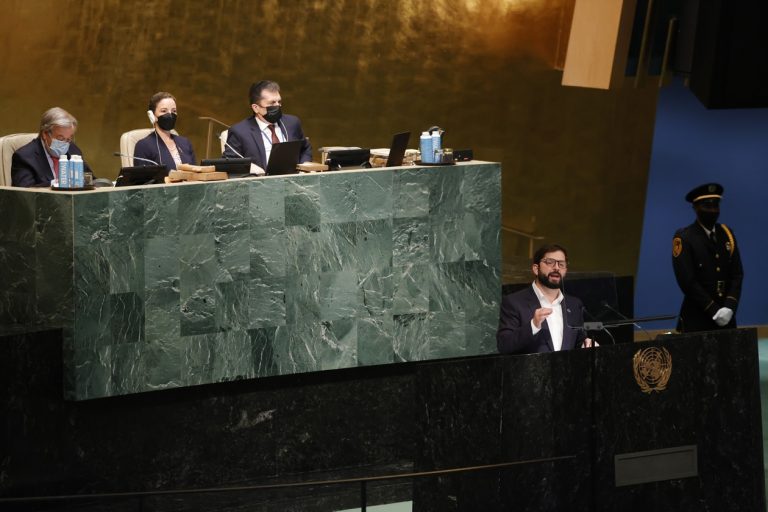21 de septiembre 2022

Children of Exile: The Births “Sowing Hope” in the Camp of Nicaraguan Farmers

PUBLICIDAD 1M
PUBLICIDAD 4D
PUBLICIDAD 5D
The Chilean President highlighted that “having different opinions does not make us enemies.”

New York (United States), 20/09/2022.- Chilean President Gabriel Boric Font delivers his address during the 77th General Debate inside the General Assembly Hall at United Nations Headquarters in New York, New York, USA, 20 September 2022. (Estados Unidos, Nueva York) EFE/EPA/JASON SZENES
The President of Chile, Gabriel Boric, called on Tuesday to “contribute” to the release of political prisoners in Nicaragua, and said during his speech at the 70th General Assembly of the United Nations that the problems that afflict different societies are solved with “more democracy and not with less.”
Boric asked “to carry out the necessary actions, and not only declarations, and to put an end to the abuse of the powerful anywhere in the world, and to continue working to contribute to the freedom of political prisoners in Nicaragua.”
According to data endorsed by the Inter-American Commission on Human Rights (IACHR), there are currently more than 200 political prisoners in Nicaragua, as a result of the country’s sociopolitical crisis.
The Office of the United Nations High Commissioner for Human Rights (OHCHR) reported a deterioration in the fulfillment of human rights in Nicaragua in the last four years, including attacks against the freedoms of expression, assembly, and mobilization, in addition to actions against the press and the Catholic Church, which have led to the exile of hundreds of thousands of people, including hundreds of journalists and dozens of priests and nuns.
“The road to face the problems that afflict our societies is paved with more democracy and not with less, encouraging participation and not restricting it, promoting dialogue and never censoring it and, above all, respecting those who think differently,” said Boric.
The former student leader who last December became the youngest president in Chilean history, also stressed that “having different opinions does not make us enemies.”
“I rebel against the abyss that some pretend to dig against the legitimate diversity of opinions. From Chile we declare our willingness to work towards filling these gaps that prevent us from meeting as diverse societies,” he added.
The president recalled that Chile opted for democracy to solve the social outburst of 2019, the largest wave of protests since the end of the military dictatorship, with some thirty deaths, thousands of wounded and accusations against the security forces for human rights violations.
Boric gave an overview of almost three years that Chile has experienced since the revolts and recalled that last September 4th, an overwhelming majority of Chileans (62%) rejected in a plebiscite the proposal for a new constitution drafted by a convention of progressive tendency elected after the protestas.
“Some have wanted to see the results of the plebiscite as a defeat for my government. A government should never feel defeated when the people speak out,” he emphasized.
The progressive leader also warned that no country is exempt from suffering a social crisis like the one experienced by Chile in 2019 because “inequality is a latent threat for democracy” and called for anticipating “social injustice.”
“We need a united voice from Latin America, more joint work from the global south, a modernized United Nations,” he concluded.
This article was originally published in Spanish in Confidencial and translated by Havana Times
Archivado como:
PUBLICIDAD 3M
Agencia de noticias internacional con sede en Madrid, España. Fundada en Burgos durante la guerra civil española en enero de 1939.
PUBLICIDAD 3D